Introduction
This report has been prepared by the SSM Network of Enforcement and Sanctions Experts to present comprehensive statistics on sanctioning activities carried out in 2024 by the ECB and the national competent authorities (NCAs) of European Union (EU) Member States participating in the Single Supervisory Mechanism (SSM) in relation to breaches of prudential requirements.
The report looks at formal sanctioning proceedings conducted by competent authorities within the scope of their respective powers,[1] providing data in particular on the administrative penalties that were imposed for breaches of prudential requirements on supervised entities, other legal persons and natural persons falling within the scope of prudential supervision in the context of the SSM.[2]
The report presents aggregate statistics for the whole of the SSM. Data have been collected and compiled using standardised categories to ensure that information is harmonised and comparable.[3]
Main findings
In 2024 the number of proceedings conducted by competent authorities increased by 19% compared with the previous year, and the number of penalties imposed rose by 8%. Proceedings relating to natural persons accounted for 54% of all proceedings handled and 45% of penalties imposed. The others concerned less significant institutions (LSIs), significant institutions (SIs) and legal persons other than SIs or LSIs.[4]
By year-end, a total of 182 administrative penalties had been imposed. Pecuniary penalties accounted for 77% of these, with fines totalling around €27.9 million. The highest pecuniary penalty, €10.4 million, was levied against an SI. For other types of person, the highest pecuniary penalties were around €5.7 million for an LSI, €0.1 million for a natural person and around €0.1 million for a legal person other than an SI or an LSI. The remaining 23% of penalties were non‑pecuniary in nature.
The sanctioning proceedings conducted and finalised with penalties in 2024 focused mainly on breaches of prudential requirements in the area of internal governance, in line with the SSM supervisory priorities for 2024-26 (particularly the objective to accelerate the effective remediation of shortcomings in governance). In addition, a significant number of sanctioning activities were conducted in relation to reporting and large exposure breaches. There were also a considerable number of proceedings relating to capital requirements and qualifying holdings, and some penalties imposed in relation to own funds, capital requirements and liquidity.
Data on formal proceedings that were ongoing at the end of 2024 suggest that governance is likely to stay a focal point in terms of SSM sanctioning activities going forward. It is also among the supervisory priorities for 2025-27.
Sanctioning proceedings conducted in the SSM in 2024
Overall figures
At the beginning of 2024, 148 formal sanctioning proceedings[5] were actively being conducted by competent authorities in the SSM (Table 1). Of these, 13 had been opened in previous years by NCAs acting at the ECB’s request pursuant to Article 18(5) of the SSM Regulation. A total of 293 new formal sanctioning proceedings were then opened in the course of 2024.[6]
Table 1
Numbers of formal sanctioning proceedings in 2024
Total number of proceedings | of which, originally initiated at the ECB’s request | |
|---|---|---|
Ongoing at the start of 2024 | 148 | 13 |
Suspended at the start of 2024 | 216** | 123 |
Newly opened in 2024 | 293 | 22 |
Total handled in 2024 | 441 | 35 |
Completed in 2024 | 221 | 11 |
of which, finalised with a penalty | 201 | 1 |
of which, closed without a penalty | 20 | 10 |
Ongoing at the end of 2024 | 220 | 24 |
* This does not include suspended proceedings, which are listed separately.
** This figure comprises 216 proceedings that were suspended prior to 2024 owing to criminal proceedings pending before national courts against the same person(s) in connection with the same facts. These proceedings remained suspended at year-end.
Including proceedings that were ongoing at the beginning of 2024, the competent authorities comprising the SSM handled a total of 441 formal sanctioning proceedings over course of the year. Of those, 221 were completed in 2024, while 220 remained ongoing at the end of the year.
More than half of all proceedings handled in 2024 related to breaches in the area of internal governance (55%), with the next largest shares relating to reporting (12%), large exposures (12%), capital requirements (6%), qualifying holdings (5%) and other (7%). Chart 1 presents a breakdown of the proceedings conducted in 2024 by area of infringement.
Chart 1
Breakdown of formal sanctioning proceedings conducted in 2024 by area of infringement
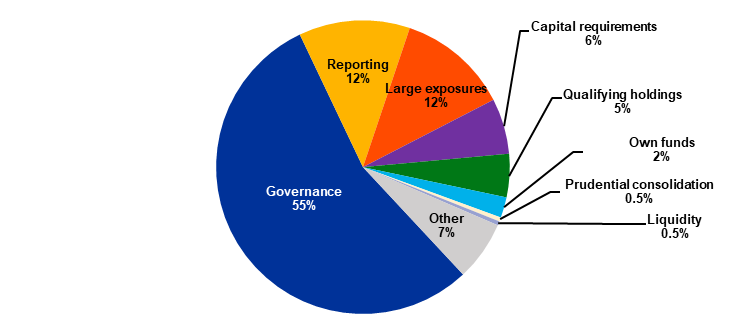
Note: “Other” consists mainly of breaches of national prudential requirements.
In the area of internal governance, the sanctioning proceedings conducted in 2024 continued to relate predominantly to (i) risk management and internal controls, and (ii) organisational requirements (including as regards the functioning of management bodies and committees).
As regards the types of person that were the subject of proceedings, these comprised SIs, LSIs and their officials, as well as legal persons other than SIs or LSIs. Specifically, 54% of the 441 proceedings handled in 2024 concerned natural persons (95% of whom were officials at LSIs).[7] The second largest group concerned was LSIs, in 40% of proceedings handled.[8] The other 6% of proceedings conducted in 2024 concerned SIs and other legal persons falling within the scope of the SSM. Chart 2 presents a breakdown of the proceedings conducted in 2024 by type of person.
Chart 2
Breakdown of formal sanctioning proceedings conducted in 2024 by type of person
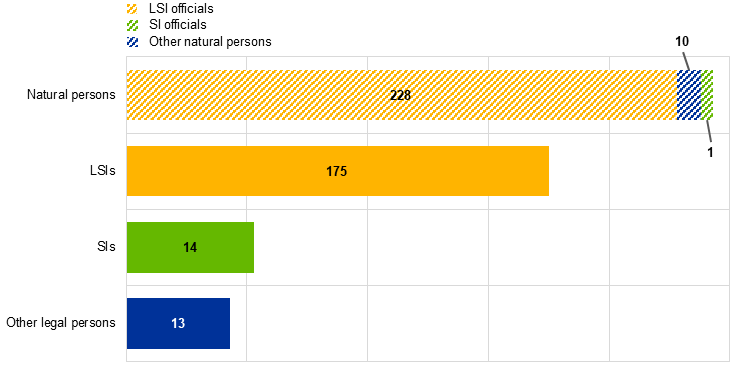
Proceedings completed by the end of 2024
A total of 221 formal sanctioning proceedings were completed in 2024 (50% of the total number handled). Each of those proceedings ended with either a decision to impose a penalty or a decision to close the proceedings without imposing any penalty (Table 1 and Chart 3). The other 220 proceedings were still ongoing at the end of the year.
Chart 3
Outcome of formal sanctioning proceedings conducted in 2024
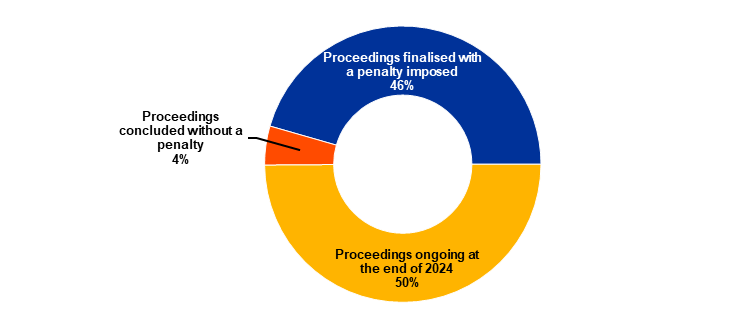
See Section 3 for further information on the proceedings finalised with a penalty.
Of the 441 proceedings handled in 2024, 20 (4%) were closed without a penalty being imposed.[9] In eight of these proceedings, the liability of the persons concerned was confirmed but no penalty was imposed in light of the unprecedent circumstances of the cases and the cooperation illustrated by those persons. Six other such proceedings were closed because, upon closer assessment, it was concluded that no breach had been committed. In four proceedings, the alleged breaches were not considered to be sufficiently material or severe, and two proceedings were closed due to the statute of limitations and the death of the relevant person. The figures for this type of proceeding may also reflect policy considerations that were taken into account by the national legislator or the respective competent authority when deciding which breaches should be pursued.
Most of the proceedings that were closed without a penalty related to alleged breaches in the areas of internal governance (50%) and qualifying holdings (40%).
Proceedings ongoing and suspended at the end of 2024
At the end of 2024, 220 formal sanctioning proceedings (50% of the total number handled) were still ongoing, although the majority of these were in an advanced procedural stage. 24 of the proceedings had been opened by NCAs at the ECB’s request pursuant to Article 18(5) of the SSM Regulation.
The proceedings ongoing at the end of 2024 mainly relate to suspected breaches in the areas of internal governance (51%), large exposures (14%) and capital requirements (11%).
In addition, 216 proceedings opened and suspended prior to 2024 (of which 123 had been opened by NCAs at the ECB’s request in previous years pursuant to Article 18(5) of the SSM Regulation) remained suspended at year-end, as shown in Table 1.[10]
Administrative penalties imposed in 2024
Overall figures
Of the 221 formal sanctioning proceedings completed in 2024, 201 (91%) resulted in the imposition of a total of 182 administrative penalties (140 pecuniary and 42 non-pecuniary). Chart 4 presents an overview of the administrative penalties that were imposed by competent authorities in 2024 for breaches of prudential requirements.
Chart 4
Administrative penalties imposed by competent authorities in 2024
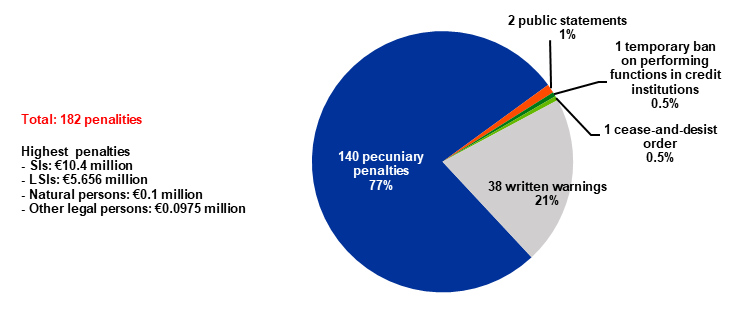
More than half of administrative penalties were imposed for breaches relating to internal governance (60%), followed by reporting (21%) and large exposures (11%), and others with far smaller shares (own funds (1%), capital requirements (1%), liquidity (1%), qualifying holdings (<1%) and other (5%)). Chart 5 presents a breakdown of proceedings concluded with administrative penalties in 2024 by area of infringement.
Chart 5
Breakdown of administrative penalties imposed in 2024 by area of infringement
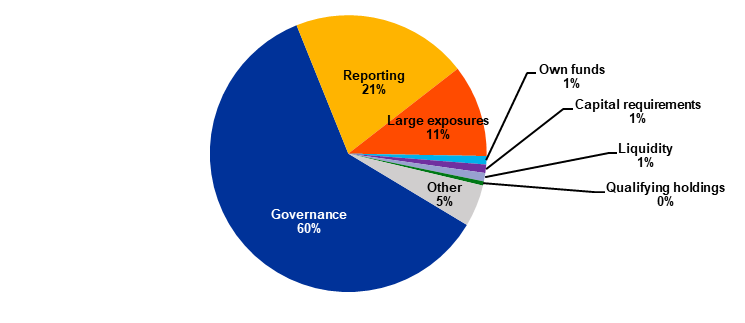
Within the area of governance, proceedings concluded with the imposition of a penalty related mainly to risk management and internal controls.
In terms of the type of person sanctioned, 104 (52%) of the 201 proceedings where an administrative penalty was imposed related to LSIs, 90 (45%) to natural persons, 5 (3%) to SIs and the remaining 2 (1%) to other legal persons falling within the remit of the competent authorities. Chart 6 presents a breakdown of all proceedings concluded with an administrative penalty in 2024 by type of person sanctioned.
Chart 6
Breakdown of proceedings concluded with an administrative penalty in 2024 by type of person sanctioned
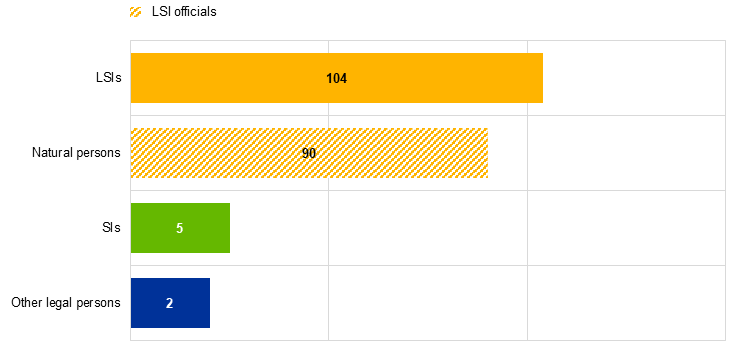
Pecuniary penalties
Of the 182 administrative penalties that were imposed in 2024 for breaches of prudential requirements, 140 (77%) were pecuniary in nature, with fines totalling around €27.905 million. One pecuniary penalty was imposed by an NCA in national proceedings opened at the ECB’s request pursuant to Article 18(5) of the SSM Regulation.
The highest pecuniary penalty was €10.4 million imposed on an SI. For other types of person, the highest pecuniary penalties were €5.656 million for an LSI, €0.1 million for a natural person and €0.098 million for a legal person other than an SI or an LSI.
Almost two-thirds of all pecuniary penalties were imposed in relation to breaches in the area of governance (59%). Chart 7 provides a complete breakdown of all breaches subject to pecuniary penalties in 2024 by area of infringement.
Chart 7
Breakdown of pecuniary penalties imposed in 2024 by area of infringement
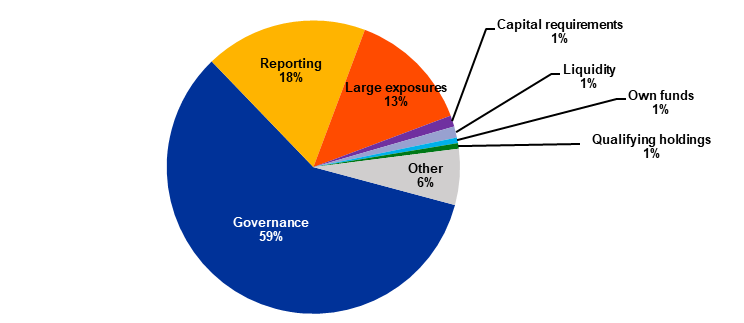
Other penalties
In addition to those pecuniary penalties, competent authorities also imposed 42 penalties of a non-pecuniary nature (which accounted for 23% of all administrative penalties imposed). These comprised 38 written warnings,[11] two public statements, one temporary ban on performing functions in credit institutions and one cease-and-desist order.
These non-pecuniary penalties were imposed on account of breaches relating to governance (67%), reporting (31%) and own funds (2%).
© European Central Bank, 2025
Postal address 60640 Frankfurt am Main, Germany
Telephone +49 69 1344 0
Website www.bankingsupervision.europa.eu
All rights reserved. Reproduction for educational and non-commercial purposes is permitted provided that the source is acknowledged.
The cut-off date for the data included in this report was 31 December 2024.
For specific terminology please refer to the SSM glossary (available in English only).
PDF ISBN 978-92-899-7253-6, ISSN 2600-4372, doi:10.2866/4389509 QB-01-25-138-EN-N
HTML ISBN 978-92-899-7252-9, ISSN 2600-4372, doi:10.2866/0996545 QB-01-25-138-EN-Q
The ECB can directly impose pecuniary penalties on significant institutions that breach directly applicable acts of EU law (including ECB decisions or regulations) in relation to which administrative pecuniary penalties shall be made available to competent authorities under the relevant EU law. It can also impose pecuniary penalties on less significant institutions for breaches of ECB regulations or decisions that impose obligations on those entities vis-à-vis the ECB. In case of breaches of national law implementing Union directives or breaches committed by natural persons, or when a non-pecuniary penalty has to be imposed, the ECB may require the relevant NCA to open national sanctioning proceedings pursuant to Article 18(5) of the SSM Regulation (Council Regulation (EU) No 1024/2013). The ECB may also address such a request to an NCA where national legislation confers specific sanctioning powers on the NCA which are not provided for by the relevant EU law. This does not affect an NCA’s ability to open proceedings on its own initiative under national law for tasks not conferred on the ECB.
The report does not cover sanctioning activities which fall outside the scope of prudential supervision within the SSM, such as activities relating to payment systems, markets for financial instruments, investment services, measures preventing the financial system from being used for money laundering or terrorist financing, and consumer protection. The report does not cover enforcement measures either.
The statistics presented in this report are calculated using data categories that differ from those applied by the competent authorities for supervisory disclosure under Article 143 of the Capital Requirements Directive (CRD; Directive 2013/36/EU). The scope of the sanctioning activities is also wider than that specified in Part 5 (“Data on supervisory measures and administrative penalties”) of Annex IV to Commission Implementing Regulation (EU) No 650/2014 laying down implementing technical standards on supervisory disclosure.
The respective supervisory roles and responsibilities of the ECB and the NCAs are allocated on the basis of the significance of the supervised entities. SIs are supervised entities (i.e. credit institutions, financial holding companies, mixed financial holding companies and branches established in participating Member States by credit institutions established in non-participating Member States) that are classified as “significant” on the basis of the criteria set out in Article 6(4) of the SSM Regulation and are supervised directly by the ECB. LSIs, by contrast, are subject to indirect supervision by the ECB – i.e. they are directly supervised by the NCAs, with the ECB providing oversight.
In this report, a “proceeding” is not the same as a “case”. If a case concerns multiple breaches, these are reported as different proceedings.
See the explanation in footnote 1. For the purposes of this report, a proceeding is considered to be “opened” when either (i) a formal act declaring the opening of the sanctioning proceedings is adopted by the relevant decision-making body of the competent authority before the persons concerned are formally granted the right to be heard for the first time on the facts established and the objections raised against them, or (ii) the persons concerned are formally granted the right to be heard for the first time on the facts established and the objections raised against them.
For the purposes of this report, “LSI official/SI official” is a member of the management body or key function holder of an LSI/SI falling within the scope of the SSM sanctioning activities.
In line with the composition of the SSM, where LSIs represent 69% of all supervised entities. In total, there were 2,784 supervised entities in 2024, with 114 supervised groups (comprising 872 individual entities) classified as “significant” as of 30 November 2024 and 1,912 entities classified as LSIs in the second quarter of 2024. For more detailed information, see the ECB Annual Report on supervisory activities 2024.
Proceedings being “closed” means that the proceedings were completed without the ECB or the relevant NCA imposing a penalty. This also includes (where applicable) ECB proceedings opened pursuant to Article 18(5) of the SSM Regulation which were ultimately closed without a request being addressed to the relevant NCA.
All of these proceedings had been suspended owing to criminal proceedings pending before national courts against the same person(s) in connection with the same facts.
In some participating Member States, warnings are categorised differently under national law, being regarded not as a penalty, but as a supervisory or enforcement measure. The data presented in this report do not include such measures, since they are not adopted following formal sanctioning proceedings.


